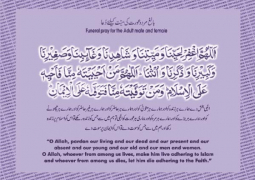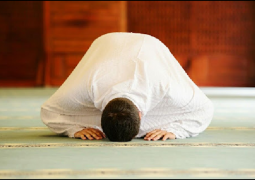
Covering graves or tombs is not permissible, because this involves unnecessary expense for an invalid cause, and may mislead the common man. ‘Aisha reported: “The Prophet, peace be Up on him, left on a raid. I covered the door with a piece of cloth. The Prophet, peace be upon him, noticed the cloth when he returned. He pulled at it until he tore it. Then he said: ‘Allah did not order us to cover stones and clay’.’’ (Reported by Bukhari and Muslim)
Building Mosques or Placing Lights on Graves
There are many sound and clear hadith concerning the unlawfulness of building mosques over graves or putting lights on them. Abu Hurairah reported: “The Prophet, peace be upon him, said: ‘May Allah destroy the Jews, because they used the graves of their prophets as places of worship.’’ (Bukhari and Muslim)
Ibn ‘Abbas reported: “The Messenger of Allah, peace be upon him, cursed the women who visit graves and those who build mosques and place lights on them.’’ (Reported by Ahmad and other compilers of the Sunan except Ibn Majah. Tirmizhi considers it a sound hadith) Abdullah Al-Bujali said: “I heard Allah’s Messenger, peace be upon him, five nights before his death, saying: ‘I declare myself innocent before Allah of having an intimate friend from among you. Indeed, Allah, the Mighty and the Majestic, has taken me as an intimate friend just as he took Ibrahim as His intimate friend. Had I to take an intimate friend from among you, I would have taken Abu Bakr as my intimate friend. Before you there was a group who turned the graves of their prophets and their righteous ones into mosques. Do not tum graves into mosques. I forbid you to do that’.’’ (Muslim) Abu Hurairah narrated: “The Prophet, peace be upon him, said: ‘May Allah curse Jews and Christians for they turned the graves of their Prophets into places of worship’.’’ (Muslim Bukhari and Muslim)
‘Aishah reported: “Umm Habibah and Umm Salamah mentioned to Allah’s Messenger, peace be upon him, a church in which they saw drawings while in Abyssinia, whereupon he said: ‘Those people used to build a place of worship over the grave of a righteous man among them when he died and make such drawings in it. These will be the worst of people in the sight of Allah on the Day of Resurrection.’’ (Bukhari and Muslim) The author of Al-Mughni said: “It is not permissible to build mosques around graves because of the statement of the Prophet, peace be upon him, ‘May Allah curse the women who visit graves and those who build mosques and place lights over them.’’’ (Reported by Abu Daw’ud and Nasa’i) If it were permissible, the Prophet, peace be upon him, would not have cursed those who did it. Moreover, this practice wastes money and encourages adoration of graves similar in spirit to the adoration of idols. Because of this report it is not permissible to build mosques over graves. Besides, the Prophet, peace be upon him, said, “May Allah curse the Jews who turned the graves of their prophets into places of worship,” in order to warn others against pursuing a similar course. (Muslim and Bukhari)
‘Aishah said: “The only reason the grave of Allah’s Messenger, peace be upon him, was not made prominent was to stop people from turning it into a mosque.” Designating certain graves as places of prayers is similar to adoring idols and seeking their pleasure. The worship of idols started with the adoration of the dead, making images of them, touching them, and offering prayers at their graves. (The commentator on this said: “It points to what Bukhari narrated from Ibn Abbas concerning the reason why the people of Noah worshipped idols. They were known as Wadd, Sawa’, Yaghuth, Ya’uq, and Nasr. These were pious people of whom they made images in order to remember them after their death and imitate them. Due to the lack of knowledge that became prevalent among the people, Satan made it appear beautiful to worship their images and likenesses, and to honor them, wipe over them, and approach them. Wiping them is passing one’s hand over them to invoke their blessing and intercession. The same was done to the graves of righteous people. This practice was initiated by idolaters, and then passed on to Jews and Christians and then to Muslims. Such objects are equivalent to idols.”)
Slaughtering Animals on the Graves
The Prophet, peace be upon him, forbade the slaughtering of animals at graves, which was practiced in the Days of Ignorance out of arrogance and self-conceit in order to flaunt one’s wealth. Anas reported: “The Prophet, peace be upon him, said: ‘There is no slaughtering (of animals on graves) in Islam.’’ (Abu Daw’ud) Abdul Razzaq said: “They used to slaughter a cow or a sheep by the grave.” Al-Khattabi said: “During the Days of Ignorance the people used to slaughter camels by the graves of generous people. They used to say: ‘We would like him to be rewarded for his deeds. He used to slaughter them when he was alive and feed them to his guests. We slaughter these camels at his grave to feed the lions and birds, so that he may continue feeding others even after his death as he used to do while he was alive’.” A poet said: I slaughtered my she-camel at the grave of my king, with a bright sharp sword, meticulously cleaned by polishers, on the grave of someone, who, had I died before him, would have willingly slaughtered his mounts by my grave. They believed in resurrection after death. Some people believed that if a camel was slaughtered by the grave of a person, he would be restored to life mounted on it on the Day of Resurrection, whereas otherwise at his resurrection, having no mount, he would have to walk on foot.
Prohibition of Sitting, Leaning, and Walking on Graves
It is not permissible to sit on a grave, or lean on it, or walk over it. This is based on a hadith reported by ‘Amr bin Hazm who said: “The Prophet, peace be upon him, saw me leaning on a grave, so he said: ‘Do not harm the dweller in this grave or do not harm him.’’’ (Reported by Ahmad, who considers its chain of narrators as sound) Abu Hurairah reported: “The Prophet, peace be upon him, said: ‘It is better for you to sit on a glowing coal that burns through your clothes to your skin than to sit on a grave.’’ (Reported by Ahmad, Muslim, Abu Daw’ud, Nasa’i, and Ibn Majah) In the opinion of Ibn Hazm this statement amounts to an outright prohibition because of the warning contained in it. He said this is the opinion of a group of the early Muslims of whom Abu Hurairah is one.
The majority of scholars hold that such an act is merely disapproved. An-Nawawi said: “Ash-Shafi’i (See Al-Shafi’i’s work Al-Umm) and the companions mentioned in various narrations disapprove of sitting on a grave, holding it to be makruh tahrimi, (Makruh is divided into Makruh Tahrimi “that which is nearly unlawful without it being actually so,” and Makruh Tanzihi “that which approaches the lawful.”) a term well-known to jurists. The majority of scholars including An-Nakha’i, Al-Laith, Ahmad, and Daw ‘ud hold this view, they also disapprove of reclining or leaning on a grave.”
Ibn ‘Umar, Abu Hanifah, and Malik are of the opinion that it is permissible to sit on a grave. Malik said: “We think that prohibition of sitting and leaning on graves means prohibition of using them to answer the call of nature.’’ (Al-Muwatta) He cited a weak hadith in this regard. Ahmad considers the interpretation of Malik weak and said: “This is not an argument.” An-Nawawi said that this interpretation is weak or false. Likewise, Ibn Hazm regards it invalid for a number of reasons. This difference of opinion concerns sitting on graves. However, there is agreement among the jurists; however, that sitting on the graves to answer the call of nature is unlawful. The jurists also agree on the permissibility of walking over graves if necessary, when for instance, there is no other way of reaching the grave of one’s dear one.
To be continued
Read Other Articles In Muslims Hands
THE PATH TO ISLAMIC UNITY SPECIAL EDITION ON RAMADAN
Apr 14, 2023, 12:15 PM




